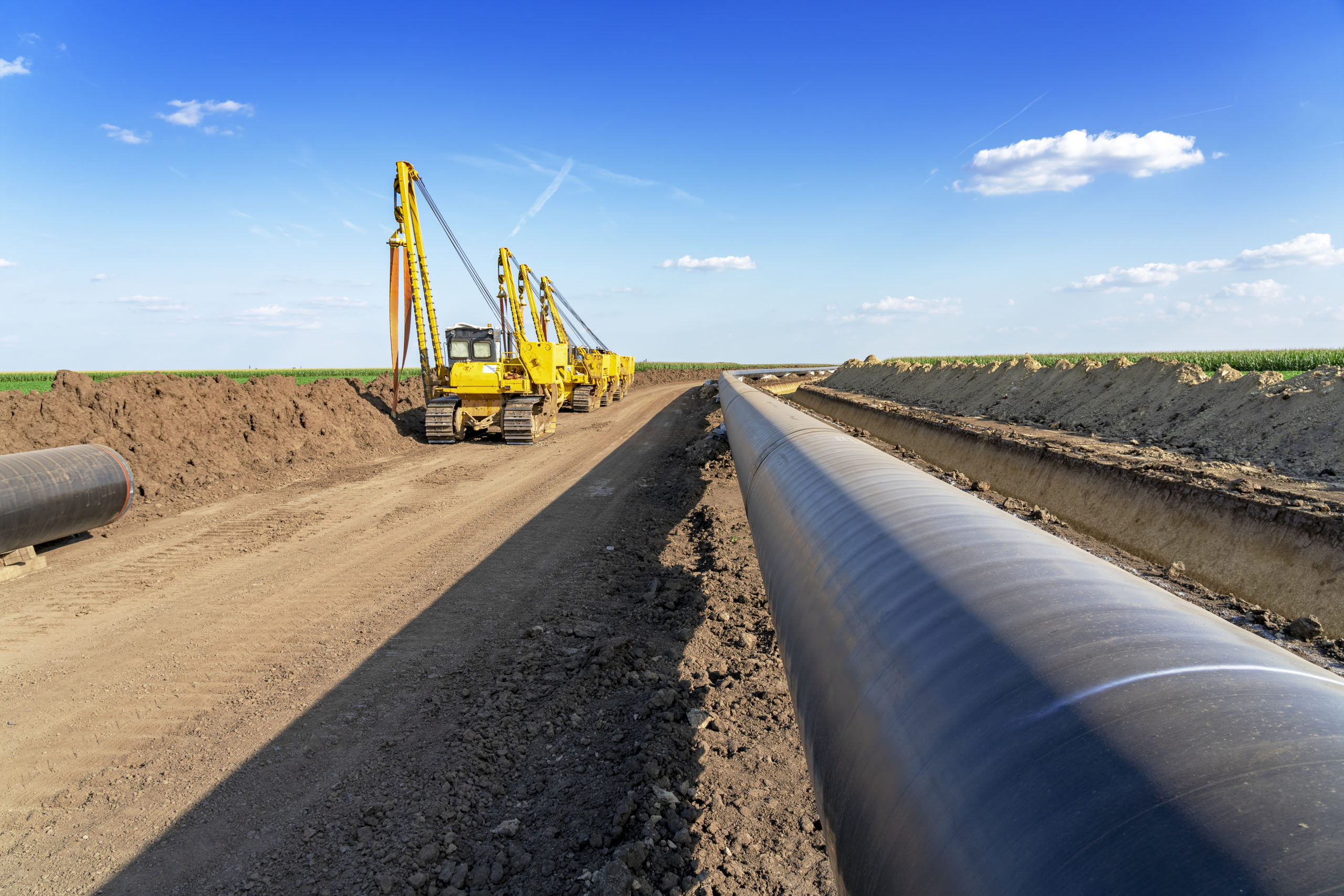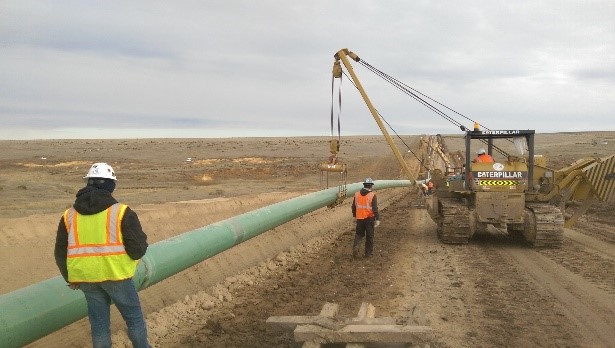A Comprehensive Overview to Recognizing Pipelines and Their Function in Construction
Pipes are essential components in building and construction, offering crucial functions in water, waste, and gas management. Their option and application can substantially influence a building's performance and security. Different materials, such as PVC, copper, and PEX, supply unique advantages matched to particular needs (Creek Pipe Pipeline Construction). Recognizing these elements is key for any kind of building project. As one discovers the complexities of pipes, the effects for compliance and public health come to be increasingly evident
The Relevance of Pipeline in Construction
Pipelines offer as crucial channels in construction, assisting in the movement of water, gas, and waste throughout structures and facilities. Their duty prolongs past mere transportation; they are important for making certain the capability and safety and security of property and business environments. Correctly mounted pipes add to the reliable distribution of resources, making it possible for daily activities such as bathing, home heating, and food preparation. Pipelines play a crucial duty in waste management, making certain that sewer and wastewater are effectively removed from living spaces.The significance of pipes is likewise shown in their effect on public health and wellness. Insufficient or defective piping systems can cause contamination and dangerous conditions, making top quality products and installment techniques vital. Furthermore, pipes should abide by various building ordinance and regulations, which are made to shield both occupants and the setting. The significance of pipelines in building encompasses both useful performance and vital wellness factors to consider.
Sorts Of Piping Utilized in Building Tasks
Numerous types of pipelines play a substantial role in structure jobs, each designed to fulfill certain needs and applications. Amongst the most generally utilized pipeline types are PVC, which is resistant and light-weight to corrosion, making it excellent for drain and air vent systems. CPVC pipes, comparable to PVC, can endure greater temperatures, usually used in warm water systems. Copper pipes are recognized for their sturdiness and reliability, often used in plumbing and home heating applications. Galvanized steel pipelines, while less typical today, were as soon as a requirement for water lines because of their toughness. Additionally, PEX (cross-linked polyethylene) pipes are obtaining popularity for property pipes due to their versatility and resistance to scaling and chlorine. Cast iron pipelines are preferred for their sound-dampening residential or commercial properties, frequently made use of in waste and soil systems. Each pipe type serves distinctive features, ensuring efficient operation in building jobs.
Usual Products for Pipes and Their Residence
In building and construction, the selection of pipeline products is critical for guaranteeing toughness and capability. Steel pipelines supply toughness and resistance to high stress, while plastic pipelines give lightweight and corrosion-resistant alternatives. Composite pipelines combine the benefits of both products, making them functional alternatives for numerous applications.
Steel Pipeline Options
Steel pipes are essential elements in construction, providing a series of options that accommodate various applications and ecological problems. One of the most usual products include steel, copper, and cast iron. Steel pipes are known for their toughness and durability, making them ideal for high-pressure applications. Copper pipelines are preferred for their deterioration resistance and antimicrobial properties, often made use of in plumbing systems. Cast iron pipes offer superb noise insulation and are optimal for waste and drain systems. Each metal kind has unique advantages; for instance, galvanized steel can withstand rust, while stainless-steel provides superior deterioration resistance. Choosing the appropriate steel pipe relies on factors such as cost, ecological exposure, and the specific needs of the building and construction job.

Plastic Pipeline Advantages
Plastic pipes have gotten popularity in construction because of their lightweight nature and flexibility. These pipelines, made from products such as PVC, CPVC, and PE, offer outstanding resistance to deterioration and chemical damages, making them suitable for numerous applications. Their convenience of setup further boosts their allure, as they can be cut and signed up with without unique devices. In addition, plastic pipes are typically a lot more cost-effective compared to metal choices, contributing to lower overall job costs. Their smooth interior surface areas reduce friction and improve circulation rates, while insulation properties assist keep temperature level control in plumbing systems - Creek Pipe Company LLC. With a broad range of setups and dimensions offered, plastic pipes properly fulfill the varied demands of contemporary building and construction projects
Compound Pipeline Characteristics
Compound pipelines incorporate various products to take advantage of their private strengths, leading to boosted efficiency and resilience. Typically, these pipelines contain layers that might include plastics, steels, and ceramics, each contributing unique residential or commercial properties. For circumstances, the inner layer may be constructed from a corrosion-resistant material, while the outer layer supplies strength and impact resistance. This mix allows composite pipelines to stand up to extreme temperatures and pressures, making them appropriate for a large range of applications, consisting of supply of water and commercial procedures. Furthermore, composite pipes are often lighter than traditional materials, helping with less complicated handling and installment. Their convenience and flexibility to various environments make them a favored selection in contemporary building and construction projects, making sure longevity and performance in liquid transportation systems.
Applications of Pipes in Pipes Solutions

Electrical Avenues: The Duty of Pipeline in Circuitry
In modern building, electric channels play a necessary role in making sure the reliable and safe transmitting of electrical wiring throughout buildings. These pipes offer a protective pathway for electric cords, safeguarding them from physical damages and environmental aspects. Various products, such as PVC, steel, and flexible channels, are made use of depending on the certain needs of the installation.Furthermore, conduits assist in arranging circuitry systems, decreasing the danger of electric dangers like brief circuits or fires. They likewise promote simpler maintenance and upgrades, as cables can be accessed and replaced without considerable disruption to the structure.Proper setup of electrical channels is crucial for conformity with structure codes and safety laws. This organized strategy not just boosts the durability of the electric system however likewise adds to the overall safety and performance of the structure, making electrical conduits vital in modern-day building and construction techniques.
Picking the Right Pipeline for Your Job
Exactly how can one guarantee the best pipe selection this hyperlink for a construction task? The choice process begins with understanding the specific needs of the task, including the type of fluids being transported, stress scores, and environmental problems. Product choices, such as Copper, steel, and pvc, ought to be assessed based upon sturdiness, rust resistance, and thermal properties.Next, one should take into consideration the pipeline's diameter and circulation capability to determine reliable operation. Regulatory requirements and codes must also be complied with, as they dictate the appropriate materials and techniques for details applications. Consulting with specialists and using considerable Full Article sources can further help in making informed decisions.Finally, reviewing the cost-effectiveness of various choices is essential, stabilizing initial expenses with lasting maintenance and substitute costs - Creek Pipe Midland. By meticulously examining these elements, one can with confidence select one of the most ideal pipe for their construction job, assuring both functionality and conformity

Upkeep and Assessment of Pipeline in Construction
Correct option of pipelines sets the structure for their long-lasting performance, making upkeep and assessment important elements in construction. Routine maintenance warranties that any kind of prospective issues, such as leakages, corrosion, or clogs, are determined and addressed without delay, lessening expensive repairs and project delays. Set up assessments, including aesthetic assessments and stress examinations, play a crucial duty in examining the honesty of pipe systems.Additionally, checking environmental variables, such as temperature variations and soil problems, can help expect wear and tear. Using innovative innovations, such as CCTV for indoor evaluations, can boost the effectiveness of maintenance initiatives. It is crucial to record inspection findings and upkeep tasks to develop a thorough background of the pipe systems. By focusing on maintenance and examination, building and construction experts can expand the lifespan of their piping systems, ensuring they operate effectively and reliably throughout the project's duration.
Often Asked Inquiries
Just How Do Pipes Influence Power Efficiency in Buildings?
Pipes considerably influence power performance in structures by managing home heating and cooling down systems. Proper insulation and products reduce power loss, while reliable plumbing layouts reduce water use, inevitably resulting in reduced energy consumption and operational prices.
What Rules Govern Pipeline Installment in Building?
Regulations regulating pipe setup in building and construction usually consist of regional and national building codes, plumbing codes, and safety criteria. These warranty conformity with structural integrity, material requirements, and wellness demands, promoting security and effectiveness in building practices.
Can Piping Be Recycled After Usage?
The inquiry of pipeline recyclability is significant. Several materials, such as metal and particular plastics, can be recycled effectively. The problem and type of pipeline impact recycling usefulness, necessitating correct evaluation prior to disposal.
Exactly How Do Climate Conditions Influence Pipe Performance?
Climate conditions considerably affect pipe efficiency. Severe temperatures can trigger development or contraction, while wetness might lead to corrosion. Furthermore, hefty precipitation can enhance dirt stress, affecting stability and general capability of the piping system.
What Are the Signs of Pipe Failure to Expect?
Indicators of pipe failure important link include leaks, uncommon sounds, staining of water, reduced water pressure, and visible rust. Routine examinations can help discover these problems early, protecting against costly repair work and guaranteeing system functionality in the long term. Pipes play an essential function in waste administration, making sure that sewer and wastewater are successfully gotten rid of from living spaces.The importance of pipelines is additionally mirrored in their influence on public wellness. In building and construction, the selection of pipeline products is important for making certain longevity and capability. Steel pipelines use stamina and resistance to high pressures, while plastic pipes provide corrosion-resistant and light-weight options. Furthermore, pipes are made use of to remove wastewater, attaching toilets, sinks, and drains pipes to metropolitan sewer systems or septic tanks.Different types of pipes, such as PVC, copper, and PEX, are picked based on aspects like toughness, expense, and particular application requirements. Just how can one ensure the best pipe option for a building project?